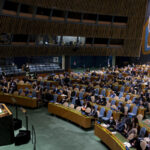
DUBAI, United Arab Emirates (AP) — Saudi Arabia announced Thursday it would send its ambassador back to Lebanon after a diplomatic spat last year.
The state-run Saudi Press Agency reported that the kingdom made the decision after the “calls and appeals of the moderate national political forces in Lebanon.” The kingdom also said Lebanon had agreed to “stop all political, military and security activities affecting” it and other Gulf Arab nations.
Lebanese Prime Minister Najib Mikati welcomed the Saudi decision. “We affirm that Lebanon is proud of its Arab affiliation and wants the best relations with the Gulf states, which were and will remain our support,” Mikati wrote on Twitter.
Saudi Arabia withdrew its ambassador in 2021 after the Lebanese information minister at the time described the war in Yemen as an aggression by Saudi Arabia and the United Arab Emirates.
A Saudi-led coalition has been battling Yemen’s Houthi rebels there since March 2015.
The row was one of the worst rifts between Gulf Arab nations and Lebanon in years. Relations have been strained over growing Iranian influence in the small nation, where Saudi Arabia has traditionally been a powerful ally.
Last December, France’s president and Saudi Arabia’s crown prince held a joint phone call with Lebanon’s prime minister during Emmanuel Macron’s visit to the kingdom to try to ease tensions between Beirut and Riyadh.
But in January, the leader of Lebanon’s Iranian-backed militant group Hezbollah, Hassan Nasrallah, responded by accusing Riyadh of helping spread extremist Islamic ideology worldwide and taking the thousands of Lebanese who work in the oil-rich Persian Gulf region “hostage.”
Lebanon is struggling with an economic crisis that began in October 2019, rooted in decades of corruption and mismanagement. The meltdown has left three-quarters of the small Mediterranean country’s population of 6 million people, including 1 million Syrian refugees, in poverty.
The Saudi announcement came amid the holy Muslim fasting month of Ramadan and as the kingdom appears to be recalibrating its diplomatic approach in the wider Mideast.
Already, Turkey has dropped a trial targeting those who killed Washington Post journalist Jamal Khashoggi — dismembered in the Saudi Consulate in Istanbul in 2018 — as it seeks economic ties with the kingdom.
Meanwhile, the kingdom has also hosted talks with Yemeni government officials and pro-government factions this month that saw that country’s exiled president cede power to a presidential council on Thursday in hopes of ending the Saudi-led coalition’s long war with Yemen’s Houthi rebels.
The Iran-backed Houthis declined to attend the talks as they took place in Saudi Arabia, their adversary in the conflict.



